RUN-EU
2020-2023
RUN-EU is an alliance of seven like-minded higher education institutions drawn from all regions of Europe. We were established in 2020 under the European Universities Initiative.
Together, we’re creating a regional development-oriented European University that embodies the values of sustainability, multiculturalism, and inclusiveness in all its work.
Mission
We aim to secure the sustainable economic, social, cultural and environmental progress of our regions and stakeholders by providing our students, researchers and academics with green, digital and inclusive skills that will help them increase the competitiveness of their regions and reduce existing regional development disparities in the EU.
By 2030, RUN-EU will be a fully engaged European University, that has developed a unique new type of multinational interregional alliance, a European Zone for Interregional Development.
Our regions
All our members
share a regional
strategic focus

of Leiria
Portugal
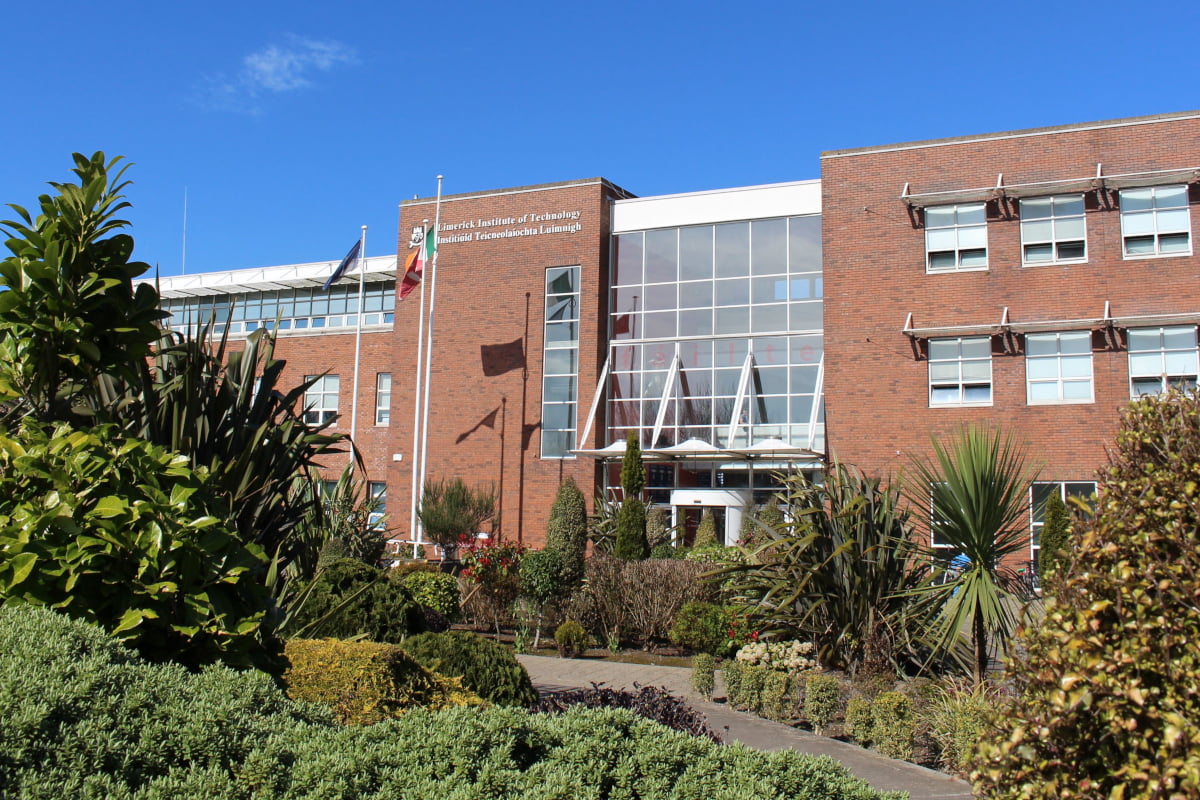
of the Shannon
Ireland

of Cávado and Ave
Portugal

of Applied Sciences
Finland

Széchenyi István University
Hungary
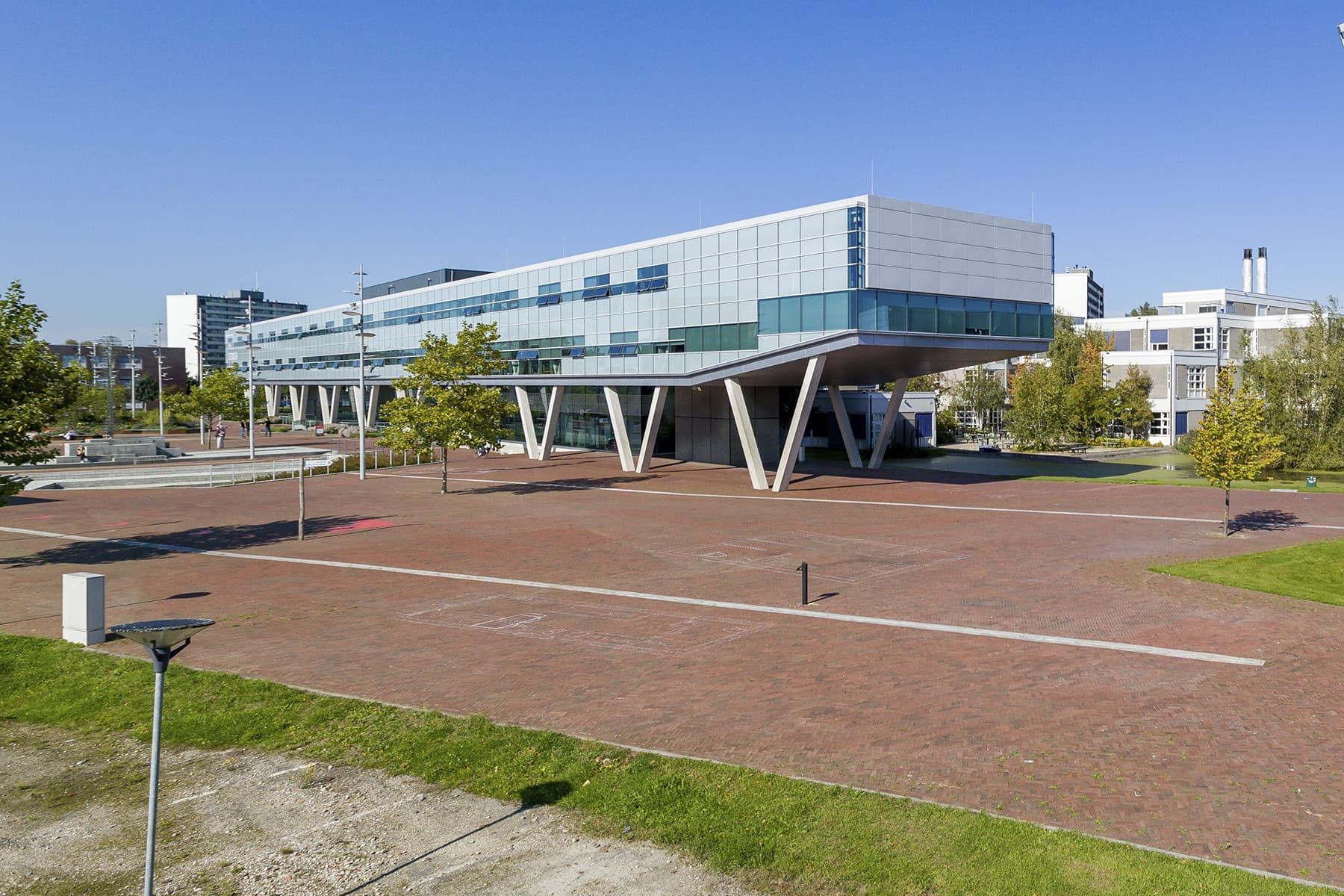
of Applied Sciences
The Netherlands

of Applied Sciences
Austria


Our goals
- To create and grow three joint interregional cutting-edge knowledge networks, the European Innovations Hubs, focused on three areas: Future Industries and Sustainable Regional Development, Bioeconomy and Social Innovation
- To develop a long-term mobility-driven strategy responsible for the identification, promotion, and creation of flexible future and advanced skills programmes, based on a challenge- and work-based curricula, the Future and Advanced Skills Academies
- To establish a European Mobility Innovation Centre, which will bring together international mobility experts (staff) from the alliance members to build and share expertise in innovative international student and staff mobility in European higher education and to monitor the quality of RUN-EU mobility activities
- To create an internship programme for the mobility of research students and staff, the Discovery Programme, which will also be responsible for forming future-looking international R&I teams and fostering sustainable R&I projects within the alliance
- To design and deliver 80 Short Advanced Programmes focused on the future advanced skills needs, which will promote flexible transnational mobility of students, innovative pedagogies, blended and life-long learning, reskilling, and upskilling
- And to design and deliver 24 double degree programmes and 3 joint programmes, which will be jointly developed by all RUN-EU members
By accomplishing these goals, we will be contributing to the sustainable economic, social, cultural and environmental progress of our regions and stakeholders, becoming a true engine of regional development.
But we won’t stop here.
In the years ahead, our alliance will share best practices and positively influence the future strategies of each of our seven higher education institutions, as well as wider European agendas, including the development of the European Education Area, the European Commission Higher Education Policy and the renewed EU agenda for higher education.
By 2030, RUN-EU will be a fully engaged European University that has developed a unique new type of multinational interregional alliance, a European Zone for Interregional Development.
Governance
We know that knowledge production is not bound by national frontiers and management structures are increasingly going global.
As a geographically dispersed European University, RUN-EU relies on a robust and transparent management structure that uses international best practices to ensure strong communication and effective participation by all members.
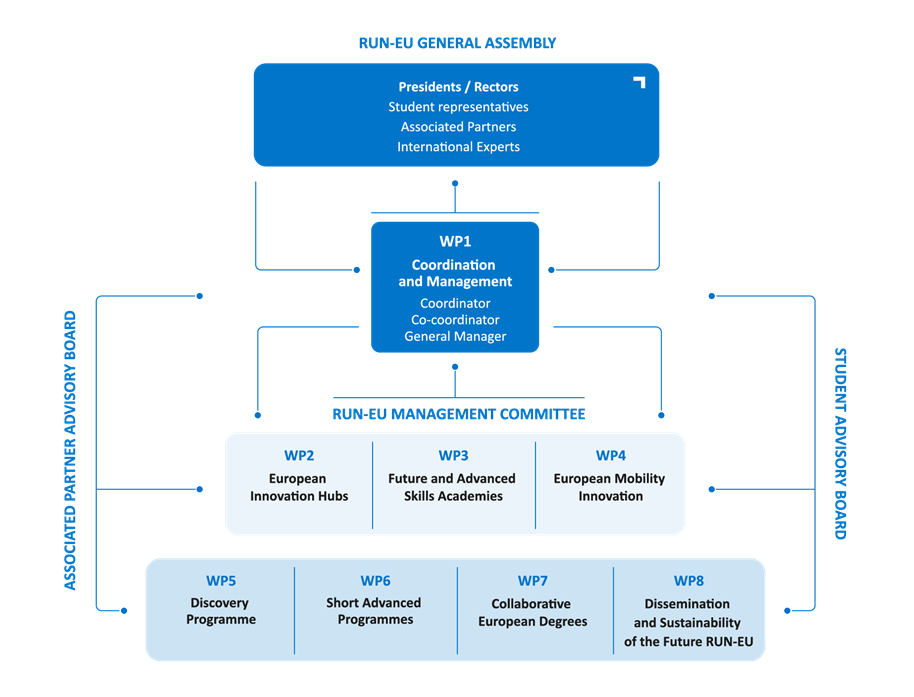
Management bodies
It is a strategic governing body that acts as a senate for the alliance and consists of:
- the rectors and/or presidents of all RUN-EU member higher education institutions;
- four elected representatives from the Associated Partner Advisory Board;
- eight elected representatives from the Student Advisory Board (one per alliance member);
- and four international experts.
In the years ahead, the alliance members will create a separate Academic Council that will coordinate the academic and scientific future of RUN-EU after the funding period, while the General Assembly will remain as the strategic governing body.
The General Assembly meets once a year to:
- evaluate and decide on the high-level RUN-EU policy decisions proposed by the coordinator or by the Management Committee
- strategically steer the main project decisions upon reviewing the reports of the coordinator and the Management Committee, describing the progress of the project and each work package
- guarantee the academic and scientific coordination of RUN-EU
- define the main guidelines for the sustainability of the RUN-EU and support the roll-out of the long-term vision strategy
- and identify potential risks, difficulties and bottlenecks that could arise during the project roll-out to determine appropriate solutions and/or contingencies.
At the General Assembly, the Student Council act as ambassadors for RUN-EU in each higher education institution and will organise student events, including dissemination activities, that will promote the RUN-EU community among students.
It monitors and coordinates the activities of the project and ensures all assigned responsibilities and deliverables are met on time and within budget.
The Management Committee is led by the RUN-EU Coordinator (from the Polytechnic University of Leiria) and co-led by the RUN-EU Co-coordinator (from the Technological University of the Shannon) and composed of staff representing all members of the alliance.
It meets twice a year, and its main activities and responsibilities are to:
- monitor and coordinate the activities and deliverables of the RUN-EU work packages
- detect any potential deviation in the implementation of the tasks and output delivery, deciding on corrective actions
- manage the project human and financial resources efficiently
- and monitor execution progress against key performance indicators such as the quality of the work package deliverables, implementation of the mobility activities, and the design and delivery of the Short Advanced Programmes and the collaborative European degree programmes).
Our objectives are then achieved through eight work packages:
- WP1 – Coordination and Management
- WP2 – European Innovation Hubs
- WP3 – Future and Advanced Skills Academies
- WP4 – European Mobility Innovation
- WP5 – RUN-EU Discovery Programme – Sustainable Interregional Research and Innovation Projects
- WP6 – Short Advanced Programmes
- WP7 – Collaborative European Degrees
- WP8 – Dissemination and Sustainability of the Future RUN-EU
The work packages leaders and co-leaders have regular virtual meetings and are responsible for:
- ensuring that the activities and deliverables of the work packages are implemented in time, within budget and with the expected quality
- guaranteeing that each partner is contributing as planned to the work package implementation, and assuring proper communication
- informing the Management Committee and the Coordinator of the progress of the implementation, identifying any constraint and potential deviation and proposing corrective actions
- implementing the strategic actions and needed corrective actions identified by the General Assembly, Management Committee and the Coordinator.
It strategically advises the work of the Management Committee, the Coordinator, and work packages leaders, with an emphasis on student engagement activities, inclusion and multiculturalism, as well as on the implementation and format of the innovative mobility programmes.
Each member higher education institution has its own regional Student Council (SC) that meet every six months to review and advise on the RUN-EU strategy, achievements and its impact at the institutional level.
During RUN-EU’s Annual Students Week, the students that compose each regional SC come together to integrate one general SC.
It advises RUN-EU on societal engagement and the most urgent and important emerging challenges to be tackled.
It is composed of 34 associates ranging from regional and national authorities, chambers of commerce, higher education institutions, research centres, international policy units, non-governmental organisations, and businesses.
The Associated Partner Advisory Board meets annually and elects four members to participate in the RUN-EU General Assembly.
Presidents and CEOs
-
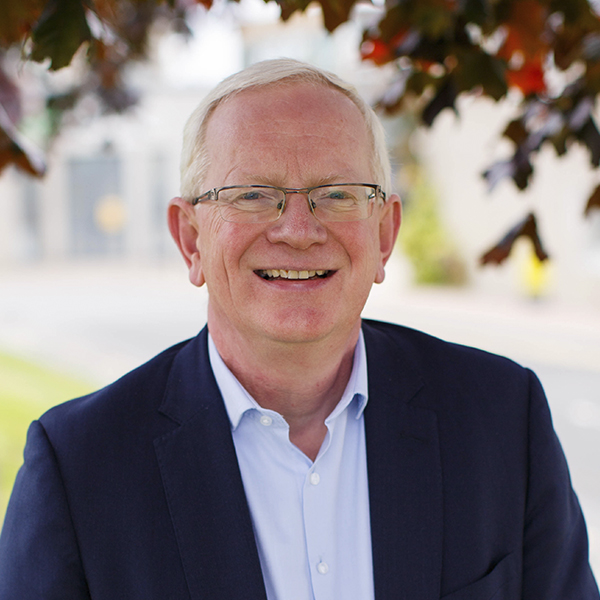 Vincent Cunnane
Vincent Cunnane- President of TUS
-
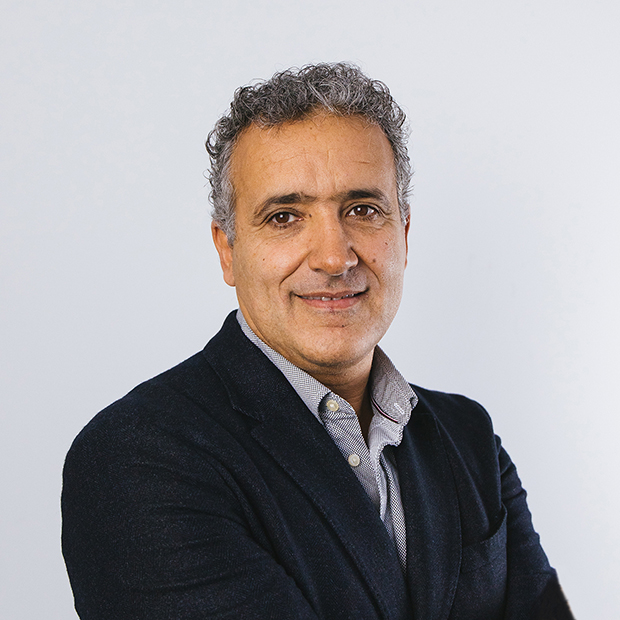 Carlos Rabadão
Carlos Rabadão- President of IPLeiria
-
 Maria José Fernandes
Maria José Fernandes- President of IPCA
-
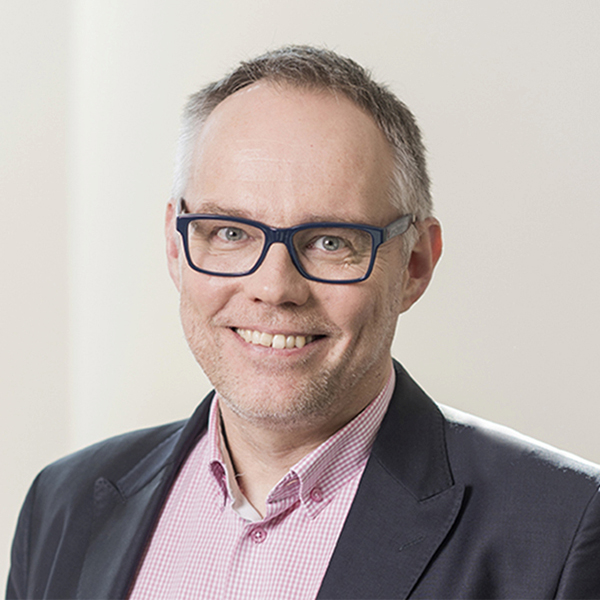 Pertti Puusaari
Pertti Puusaari- President/CEO of HAMK
-
 Bálint Filep
Bálint Filep- President of SZE
-
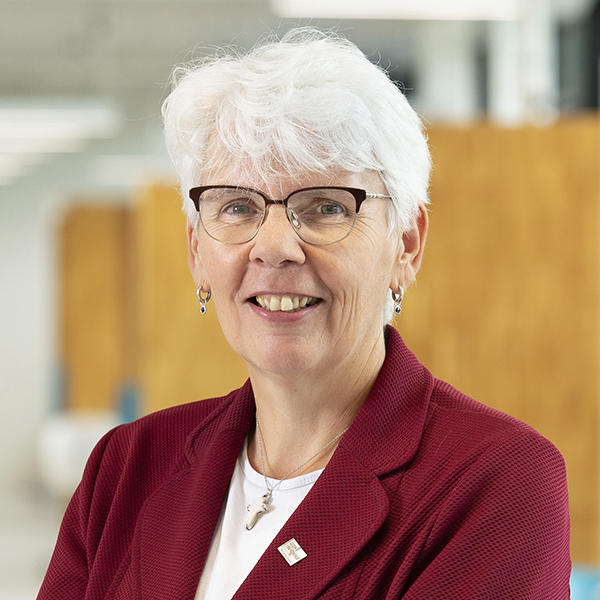 Erica Schaper
Erica Schaper- President of NHL Stenden
-
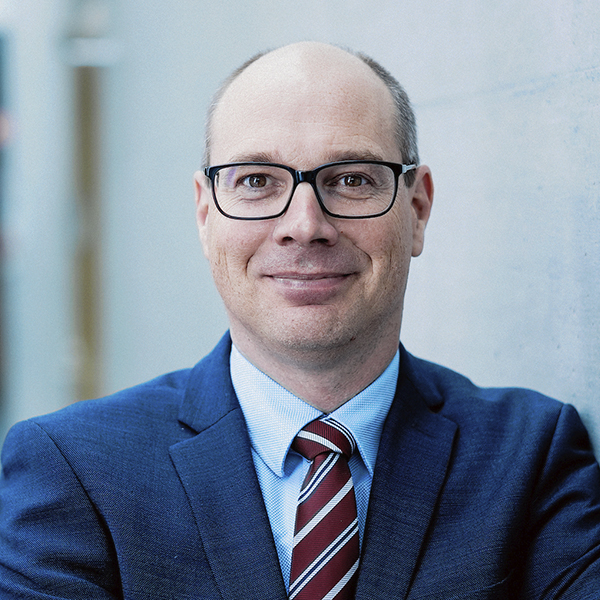 Stefan Fitz-Rankl
Stefan Fitz-Rankl- CEO of FHV
As a RUN-EU associated partner, you’re making history with us
Associated Partners
Our partnerships are essential for us to achieve our goals.
They advise us on the most urgent and important challenges of our regions.
They help us create opportunities for students and researchers to thrive.
And they show us what the future holds and what kind of skills our students will need to face such a fast-changing labour market.
By involving associated partners from each country drawn from industry and enterprise, regional government, and society in our alliance, we’re boosting the economy and ensuring the maximum relevance and impact of our activities for sustainable regional development.
Together, we’ll secure a sustainable future for our regions and build a European Zone for Interregional Development.
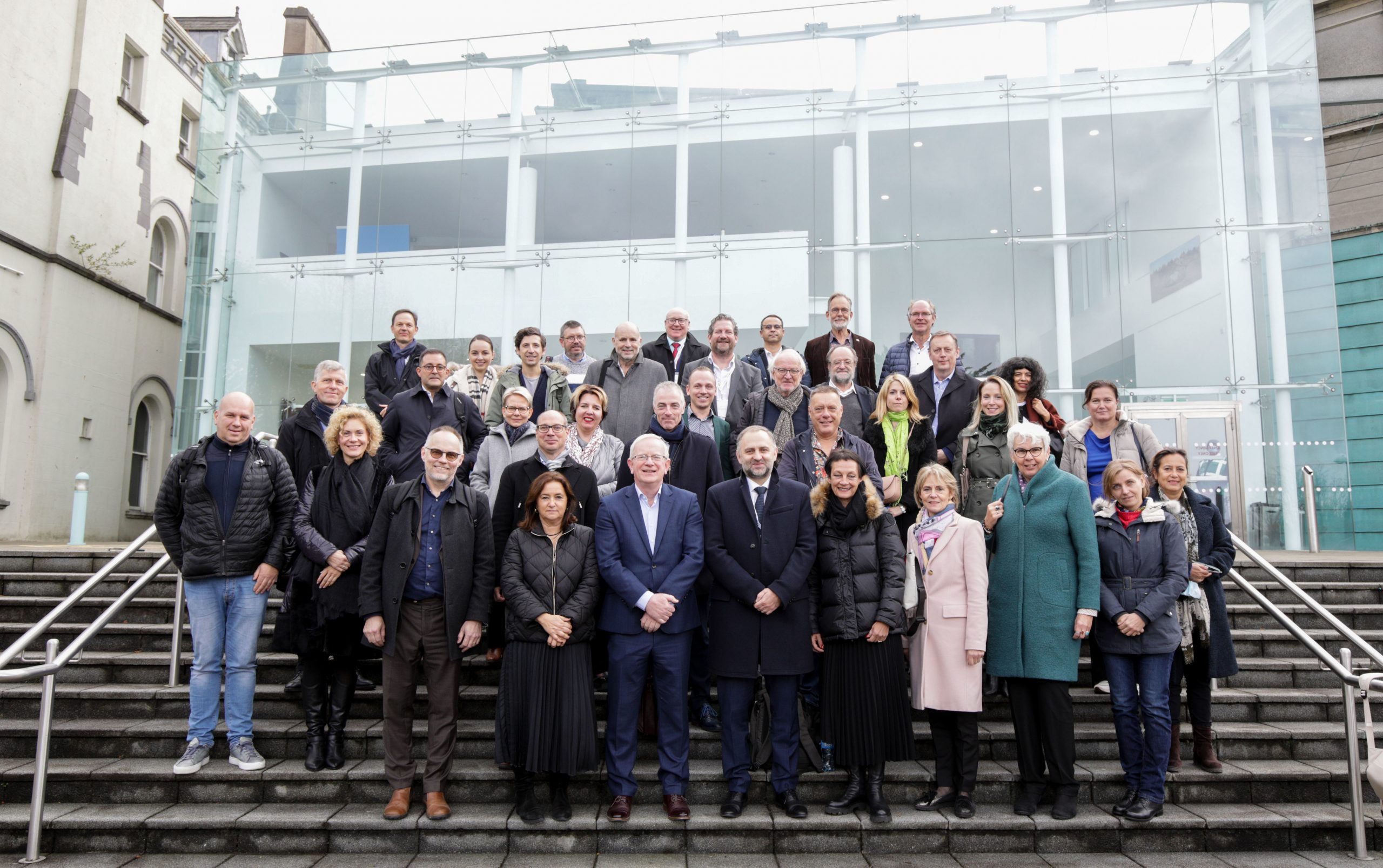
The Associated Partner Advisory Board
Our associated partners have been selected from a broad range of industry representative bodies, small and medium enterprise organisations, national and regional entrepreneurial and innovation agencies, regional government agencies, regional and national social innovation and cultural bodies and agencies.
They compose our Associated Partner Advisory Board, which advises RUN-EU on societal engagement affairs.
Every year, four representatives of the Associated Partner Advisory Board meet at the RUN-EU General Assembly to advise the Management Committee and Coordinator.
Regional Government
| Associated partner | Type | Country |
|---|---|---|
| Centro Regional Coordination and Development Commission (CCDR-C) | Public body | Portugal |
| Norte Regional Coordination and Development Commission (CCDR-N) | Public body | Portugal |
| Clare County Council | Public body | Ireland |
| Limerick City and County Council | Public body | Ireland |
| Roscommon County Council | Public body | Ireland |
| Regional Council of Häme | Public body | Finland |
| Province of Fryslan | Public body | The Netherlands |
| Municipality of Győr | Municipality | Hungary |
| Vorarlberger Landesregierung | Government | Austria |
Business and Economy
| Associated partner | Type | Country |
|---|---|---|
| NERLEI Entrepreneurial Association of the Leiria Region | NGO | Portugal |
| InvestBraga | Private Agency of Public Interest | Portugal |
| Fáilte Ireland | NGO | Ireland |
| Glanbia Ireland | Enterprise | Ireland |
| Limerick Chamber of Commerce | Public Body | Ireland |
| Hämeen Yrittäjät | NGO | Finland |
| AUDI Hungária Zrtt | Enterprise | Hungary |
| Dutch TechZone | NGO | The Netherlands |
Education, Skills Development, Society and Culture
| Associated partner | Type | Country |
|---|---|---|
| OECD Higher Education Policy Team and the Labour Market Relevance and Outcomes of Higher Education Project | Policy Unit | France |
| Agência para a Competitividade e Inovação (IAPMEI) | Public Body | Portugal |
| SPEAK | NGO | Portugal |
| Irish Development Agency Ireland | Semi-State Body | Ireland |
| Limerick for Engineering / Explore Engineering | NGO | Ireland |
| Midlands Regional Skills Forum | Enterprise – Upskilling Training | Ireland |
| TUS Athlone – Enterprise Forum | Enterprise – Higher education | Ireland |
| Győr Philharmonic Orchestra | NGO | Hungary |
| Tourism Collective Friesland | NGO | The Netherlands |
| Pädagogische Hochschule Vorarlberg (PH Vorarlberg) | Higher Education Institution | Austria |
Discovery Programme and European Innovation Hubs
| Associated partner | Type | Country |
|---|---|---|
| International Iberian Nanotechnology Laboratory (INL) | Research Centre | Portugal |
| ADAPT | Research Centre – Enterprise | Ireland |
| Centre for Research on Adaptive Nanostructures and Nanodevices (CRANN) – Trinity College Dublin | University | Ireland |
| CONFIRM | Research Centre – Enterprise | Ireland |
| Innovate Limerick | Public Body | Ireland |
| Irish Bioeconomy Foundation | NGO | Ireland |
| Centre of Expertise Water Technology / WaterCampus Leeuwarden | Research Centre | The Netherlands |
| National Test Center Circular Plastics | NGO | The Netherlands |
| Wirtschafts-Standort Vorarlberg GmbH (WISTO) | NGO | Austria |
Public documents & reports
In advancing the mission and long-term vision of RUN-EU, we have successfully achieved all milestones while integrating the ethos of a European University into the Alliance.
Here you can access the completed public deliverables and outputs which include comprehensive documents and reports produced between 2020-2023.
Set the foundations for cooperation, partner management, and quality assurance by providing a set of tools for internal guidance (including project management and quality manual, monitoring, quality control, and evaluation plan), organising regular transnational meetings (online and face-to-face), ensuring proper communication and involvement of partners, ensuring project monitoring, quality control, and evaluation of results, and producing official reports.
Focused on building sustainable knowledge networks to drive innovation in targeted areas, such as Future and Sustainable Industries, Bioeconomy, and Social Innovation, through the creation of pan-European innovation hubs.
These hubs brought together international research teams, supported by a shared infrastructure and mobile team members.
Enabled the identification, promotion and development of new future and advanced skills programmes. These programmes provided students with immersive learning experiences incorporating the latest knowledge and skills in cutting-edge areas. The FASA informed WP6 and WP7 about the new skills programmes to be developed and also informed the pedagogical design process of the new Short-Advanced Programmes (WP6) and European Double and Joint Degrees (WP7), as well as assessing the relevance and quality of the innovative educational provision produced under RUN-EU.
Defined a joint RUN-EU Mobility Strategy and Mobility Matrix to facilitate and promote an increase in mobility opportunities for students, researchers and staff within RUN-EU. In addition, a European Mobility Innovation Centre (EMIC) was established, bringing together international mobility experts (staff) from Alliance members. The role of the EMIC was to build and share expertise on innovative international student and staff mobility in European higher education and to monitor the quality of mobility in order to achieve the defined objectives.
D4.3 Student Centred Information Material: Video
Built European future-looking RDI teams using a challenge-based approach to address societal challenges. This WP focused on operationalising RDI activities through collaboration among Regional Innovation Clusters, European Innovation Hubs, and creating joint RDI teams. Integration of international RDI teams formed in WP5 into the relevant EIH was planned upon the establishment of European Innovation Hubs.
Designed and delivered Short Advanced Programmes (SAPs), based on transnational curricula and focusing on the future and advanced skills needs, enabling the promotion of flexible transnational mobility of students, innovative pedagogies and blended learning activities.
Designed and delivered collaborative European degrees, including regionally relevant double and joint degree programmes (BSc, MSc and PhD), based on transnational curricula and focusing on future and advanced skills needs, enabling the promotion of flexible transnational student mobility, innovative pedagogies and blended learning activities.
Developed and implemented the communication, dissemination and exploitation strategies, reflected in the establishment/promotion of a sound and consistent brand, in the creation/animation of the communication channels (particularly the project website and social media), in the development/deployment of promotional materials and the organisation of dissemination and exploitation events. This mainly consisted of transversal/cross-cutting activities linked to all the WPs.
Leaflets were produced to present the innovative educational results and outcomes developed to the RUN-EU community and external stakeholders, summarising the outcomes and benefits for all.
Topics covered include, for example, mobility opportunities, collaborative research and innovation opportunities, RUN-EU opportunities for students, teachers and researchers, European Innovation Hubs and the value for Associated Partners.
The leaflets were primarily online, with hard copies used only when relevant.